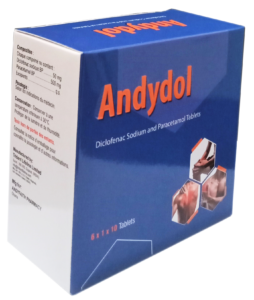Andydol
Diclofenac Sodium and Paracetamol tablet

Andydol
Description:
Andydol is a combination analgesic and anti-inflammatory tablet formulated with Diclofenac Sodium (50 mg) and Paracetamol (500 mg). It provides effective relief from a variety of pain and inflammatory conditions by combining the anti-inflammatory action of Diclofenac Sodium with the analgesic and antipyretic properties of Paracetamol.
Mechanism of Action:
- Paracetamol: Acts primarily in the central nervous system (CNS) by inhibiting prostaglandin synthesis, thereby reducing pain and fever. It is also thought to produce antipyresis by acting on the hypothalamic heat-regulating center.
- Diclofenac Sodium: A potent non-steroidal anti-inflammatory drug (NSAID) that works by inhibiting the cyclooxygenase enzyme (COX), reducing prostaglandin synthesis at sites of inflammation, thereby relieving pain, swelling, and stiffness.
Indications:
Andydol is indicated for the management of:
- Rheumatoid arthritis, osteoarthritis, ankylosing spondylitis
- Cervical spondylitis and intervertebral disc syndrome
- Sciatica and non-articular rheumatic conditions
- Post-operative and traumatic inflammation
- Acute gout
- Painful conditions in gynaecology and dentistry
- General pain and fever relief: body aches, earache, toothache, myalgia, fibrositis, neuralgia, postoperative pain
Dosage and Administration
- Adults: One tablet two to three times daily or as directed by a healthcare professional.
Adverse Effects
While generally well-tolerated, possible side effects may include:
- Nausea, vomiting, epigastric distress
- Skin rash
- Peptic ulcer, GI bleeding
- Fluid retention, oedema
- Hepatic impairment or toxicity (with high doses or prolonged use)
Contraindications
- Hypersensitivity to diclofenac, paracetamol, aspirin, or other NSAIDs
- History of gastrointestinal bleeding or ulceration
- Severe hepatic or renal dysfunction
- Acute porphyria
Special Precautions
Use with caution in patients with:
- Liver, kidney, or heart impairment
- Coagulation disorders or blood dyscrasias
- Peptic ulcer disease or GI disorders
- Long-term NSAID users (risk of renal injury)

